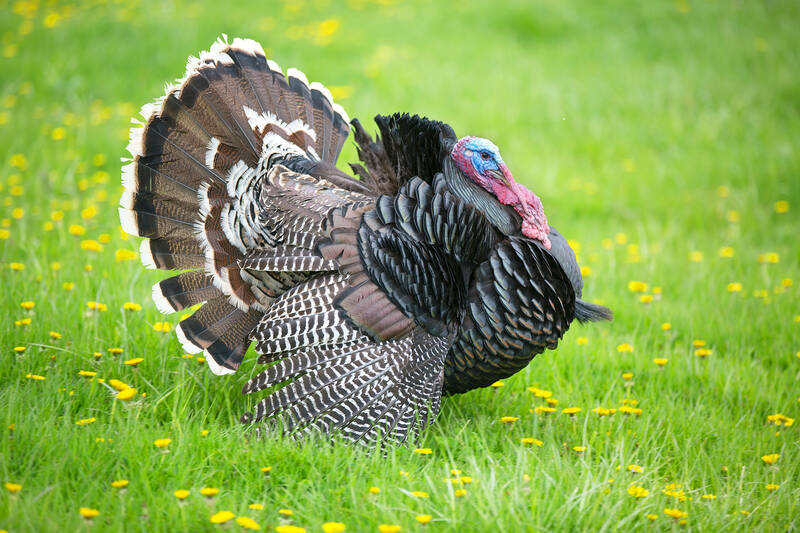It’s Thanksgiving time in the US. This involves the traditional Thanksgiving dinner, which includes a freshly cooked turkey. But what is a turkey? And why does it share a name with the country Turkey, despite being native to North America? It seems like the appropriate1time to get to the bottom of these burning questions!
The story starts with the guinea fowl, a bird from West Africa. Apparently, these birds started showing up in England in the 1500s, and the English didn’t know what to call them. They arrived from Turkey through spice trade routes, so the English called them “turkey-cocks” or “turkey-hens.”
Meanwhile, in 1526, actual turkeys started to arrive in England from North America, and the English misunderstood them to be the same type of animal. Once people figured out that the two were different species, they used the shortened name “turkey” to refer to the American bird.

Photo courtesy of Unsplash / 照片:Unsplash提供
That’s not the end of the story, though! In other languages, the name for this bird has translations that are equally puzzling. For example, in Turkey, its name means “(the bird) from India.” The Greek name means “French chicken,” and the Portuguese name is “Peru.”
But as Shakespeare wrote, “What’s in a name?” No matter what we call them, these peculiar animals have earned a place in our hearts, not to mention our stomachs. Happy Thanksgiving!
現在正是美國的感恩節。這包含了傳統的感恩節晚餐,其中有新鮮烹調的火雞。但火雞是什麼呢?而且它為何會與國家土耳其同名,儘管它原產於北美呢?似乎是徹底查明這些熱烈討論的問題的適當時機!
故事從珠雞開始,這是一種來自西非的鳥。據說這些鳥於西元1500年代開始出現在英格蘭,而英格蘭人不知該怎麼稱呼它們。珠雞透過香料貿易路線從土耳其抵達英格蘭,因此英格蘭人稱他們為「turkey-cocks(土耳其公雞)」或「turkey-hens(土耳其母雞)」。
與此同時,西元1526年時真正的火雞開始從北美傳入英格蘭,而英格蘭人將它們誤認為同一種動物。人們一理解這兩者是不同的物種時,他們就使用「turkey」這個簡稱來指這美洲的鳥。
不過,這還不是故事的結局!在其他語言中,這種鳥的名字有同樣令人困惑的翻譯。舉例來說,在土耳其,它的名字意思是「來自印度的(鳥)」。希臘語的名字意思是「法國的雞」,葡萄牙語的名字則是「Peru」。
但正如莎士比亞所寫,「名字裡又有什麼呢?」無論我們怎麼稱呼牠,這奇特的動物已經在我們心中佔有一席之地,更不用說在我們的胃了。感恩節快樂!
Key Vocabulary
1. appropriate adj. 適當的;合適的
Vince and Yvette went shopping for an appropriate wedding gift for their friends.
文斯與伊薇特去購物,為他們的朋友買合適的結婚禮物。
2. apparently adv. 據說;看來
Jamal just called. Apparently, they’re having some problems at the factory.
賈馬爾剛才打了電話。看來,他們在工廠遇到了一些問題。
3. misunderstand vt. 誤解;誤會
(三態 misunderstand-misunderstood-misunderstood)
Please don’t misunderstand me. I’m not upset with you, I’m just too tired to go out tonight.
請別誤解我。我沒有生你的氣,我今晚只是太累了無法出門。
4. species n. 物種(單複數同形)
This species has adapted to the extreme conditions of the area’s harsh climate.
此物種已經適應了該地區惡劣氣候的極端條件。
5. shorten v.(使)變短;縮短
The pants fit around her waist but they were a bit too long, so Sally had them shortened.
這件褲子符合她的腰身,但有點太長,所以莎莉將它修短。
6. peculiar adj. 奇特的;奇怪的
Danny has a peculiar eating habit; he has to scratch his chin before every meal.
丹尼有一個奇特的飲食習慣;他在每餐前都要抓下巴。
7. not to mention 更不用說;此外
I don’t want to go to the beach. It’ll be crowded, not to mention the
fact that it might rain.
我不想去海灘。那裡會很擁擠,更不用說可能會下雨。
學習音檔: https://magazine.english4u.net/Magdata/menu/d0ess
《空中美語》雜誌APP免費下載: https://www.english4u.net/apps/index.aspx
免費收聽當月《空中美語》雜誌課文朗讀及解析 !
文章由AMC空中美語授權使用: https://www.english4u.net

As the priest Antonius Hambroek stood in the dim chamber of Fort Zeelandia, his eldest daughter clung to him, her voice trembling. “Father, don’t go. They’ll kill you, and what will become of Mother and my sisters?” Outside, the sounds of Koxinga’s relentless canon siege boomed through the fortress. The defenders were on the brink of collapse. Starvation gnawed at their resolve, and the air carried the acrid stench of spent gunpowder and rotting flesh. Dutch reinforcements from Batavia had failed to arrive, leaving the garrison isolated and hopeless. Hambroek’s face was calm, though sorrow weighed heavily on his

As we bundle up in thick coats to stay warm during the winter, there is a population that has already adapted to extremely low temperatures. These people live in the remote city of Yakutsk, the coldest city on Earth. Yakutsk is situated in the heart of Siberia, which is the capital of the Sakha Republic in Russia. This historic mining city began to flourish in the 19th century following the discovery of gold deposits. Given its construction on permafrost, the average temperature in the city remains below 0°C for over half the year, with winter temperatures dropping to an astonishing -50°C.

The Dutch introduced the Indian mango (Mangifera indica) to Taiwan in the 17th century. It is a green-skinned mango with thick fibers that get stuck in the teeth, but it boasts a rich aroma and a unique taste. In 1954, Taiwan’s Council of Agriculture introduced several mango cultivars from Florida, USA, including the Irwin, Haden, and Keitt varieties. After seven years of testing and domestication, the Irwin variety was chosen for promotion. Years later, the sample saplings started to bear fruit. These mangoes were large, with thin, vibrant red peels and golden pulp. The Irwin mangoes were mouth-wateringly sweet and

對話 Dialogue 清清:今天中午我要多吃一點,不然晚上可能會吃不飽。 Qīngqing: Jīntiān zhōngwǔ wǒ yào duō chī yìdiǎn, bùrán wǎnshàng kěnéng huì chībùbǎo. 華華:怎麼了?為什麼會吃不飽? Huáhua: Zěnmele? Wèishénme huì chībùbǎo? 清清:今天大年初七,是「人日節」,傳統上結了婚的女兒要回家給父母送長壽麵,而且最好是素的,我姐姐會回來,只吃素麵,我應該很快就餓了。 Qīngqing: Jīntiān Dànián chūqī, shì “Rénrì jié,” chuántǒng shàng jiéle hūn de nǚ’ér yào huíjiā gěi fùmǔ sòng chángshòumiàn, érqiě zuìhǎo shì sù de, wǒ jiějie huì huílái, zhǐ chī sùmiàn, wǒ yīnggāi hěn kuài jiù èle. 華華:我還是第一次聽說有「人日節」呢!這是怎麼來的啊? Huáhua: Wǒ háishì dì yī cì tīngshuō yǒu “Rénrì jié” ne! Zhè shì zěnme lái de a? 清清:老一輩的人說,女媧是在第七天造出了「人」,所以今天可說是我們每個人的「生日」呢!生日快樂! Qīngqing: Lǎoyíbèi de rén shuō, Nǚwā shì zài dì qī tiān zào chūle “rén,” suǒyǐ jīntiān kěshuōshì wǒmen měi ge rén de “shēngrì” ne! Shēngrì kuàilè! 華華:你也是啊!欸?那前六天女媧都做了什麼呢? Huáhua: Nǐ yěshì a! Éi? Nà